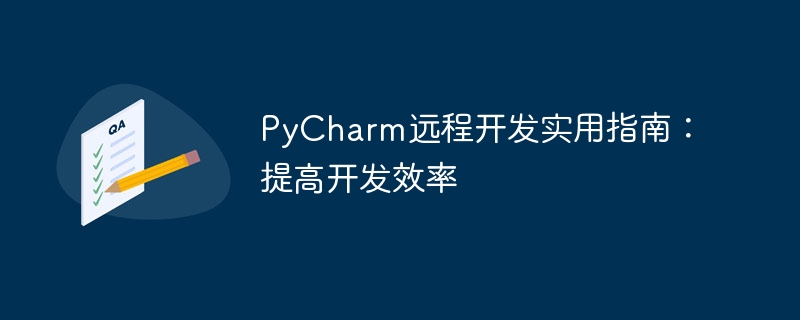

PyCharm is a powerful Python integrated development environment (IDE) that is widely used by Python developers for code writing, debugging and project management. In the actual development process, most developers will face different problems, such as how to improve development efficiency, how to collaborate with team members on development, etc. This article will introduce a practical guide to remote development of PyCharm to help developers better use PyCharm for remote development and improve work efficiency.
Before proceeding with PyCharm remote development, you first need to do some preparation work. First, make sure you have PyCharm installed and have a remote development environment, such as a remote server or virtual machine. Secondly, you need to ensure that the Python version of your local PyCharm and the remote environment are consistent, so as to avoid unnecessary problems.
Configuring the remote development environment in PyCharm is very simple. First, open PyCharm and create a new project. Then, click "File"->"Settings"->"Project: Your_Project_Name"->"Project Interpreter" in the menu bar, select "Add Remote", and then select "SSH Interpreter".
In the pop-up dialog box, enter your SSH connection information, such as host name, user name, password, etc. Once filled in, PyCharm will automatically connect to the remote environment and list available Python interpreter versions. Select the Python interpreter version you want to use and click "OK" to complete the configuration.
Once the remote development environment is configured, you can start remote file synchronization in PyCharm. In the project view of PyCharm, right-click the project folder and select "Deployment"->"Automatic Upload" so that any modifications you make will be automatically synchronized to the remote environment. This way, you can develop your code locally without manually uploading it to a remote environment.
In addition to file synchronization, PyCharm also supports remote debugging, which is very useful for locating problems and debugging code. Open your Python file in PyCharm, set breakpoints, and click the "Run"->"Debug" button to start remote debugging. PyCharm will automatically connect to the remote environment and stop executing the code at the breakpoint you set, making it easier for you to debug.
def remote_debugging_example(): x = 10 y = 20 z = x + y return z result = remote_debugging_example() print(result)
Finally, remote version control can also be easily performed in PyCharm, such as integrating with version control systems such as Git. In the project view of PyCharm, right-click the project folder and select "Git" -> "Add" to add the project to the Git repository, and then you can perform code submission, pull and other operations. In this way, team members can easily collaborate on development and maintain consistency in code versions.
To summarize, PyCharm’s remote development function can help developers conduct remote development more efficiently and improve work efficiency. By configuring functions such as remote development environment, file synchronization, remote debugging and remote version control, developers can easily perform remote development work in PyCharm. I hope the above content is helpful to you, and I wish you happy development in PyCharm!
The above is the detailed content of PyCharm Remote Development Practical Guide: Improve Development Efficiency. For more information, please follow other related articles on the PHP Chinese website!
 How to change pycharm to Chinese
How to change pycharm to Chinese pycharm installation tutorial
pycharm installation tutorial How to solve the problem that pycharm cannot find the module
How to solve the problem that pycharm cannot find the module How to install pycharm
How to install pycharm The difference between python and pycharm
The difference between python and pycharm How to configure the pycharm environment
How to configure the pycharm environment How to install the pycharm interpreter
How to install the pycharm interpreter What does pycharm mean when running in parallel?
What does pycharm mean when running in parallel?



